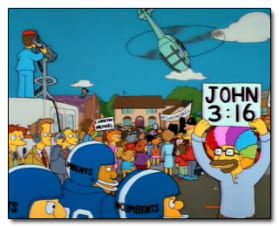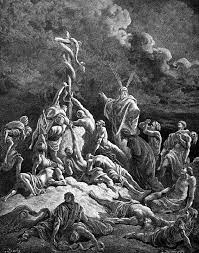Today’s gospel gets us back to the basics. Sports fans old enough to remember the 70s and 80s will recall that a regular occurrence at baseball or football games either in person or on television was, when the camera panned the stands, to see a person—often wearing a colorful fright wig—holding up a large homemade poster board sign with a cryptic reference that made sense only for initiates: John 3:16.
I often imagined the confusion that many might have felt at this ubiquitous, almost subliminal communication, especially in a pre-Google world. John 3:16? What does that mean? But for those in the know, it was no mystery, for John 3:16 is the address of perhaps the most familiar of all Bible verses, one of the verses in today’s gospel reading from John 3, the first one (followed by hundreds more) that I learned as a young Baptist boy.
For God so loved the world, that He gave His only begotten Son, that whosoever believeth in Him should not perish but have everlasting life.
In our fundamentalist, evangelical world, the whole gospel was summed up in this verse, often followed by its less quoted companion John 3:17:
For God sent not His Son into the world to condemn the world, but that the world through Him might be saved.
It really does have it all—a God of salvation rather than condemnation, of love rather than judgment, the incarnation, and—most important in the religious world of my youth—the promise of eternal life, which we interpreted as going to heaven and avoiding hell. It really is the gospel in a nutshell. Really.  I remember a crafts event during summer Bible camp when we inserted the text of John 3:16 in tiny print rolled up like a paper towel inside the two halves of a walnut shell which we then glued together with the end of the John 3:16 roll sticking out of a convenient slot. When completed, the text could be rolled out and admired, then snapped back in like a window shade.
I remember a crafts event during summer Bible camp when we inserted the text of John 3:16 in tiny print rolled up like a paper towel inside the two halves of a walnut shell which we then glued together with the end of the John 3:16 roll sticking out of a convenient slot. When completed, the text could be rolled out and admired, then snapped back in like a window shade.
Typically, but unfortunately, the textual context of this gospel in a nutshell was usually ignored. John’s gospel is strange and (for me, least) somewhat off-putting. It was written last of the four gospels, at least twenty years later than Matthew and Luke, perhaps thirty years later than Mark. The Jesus of John often sounds more like a theology professor who likes to talk a lot than the no-nonsense man of few words and mighty deeds in Mark’s gospel. In John chapter 3, Jesus is visited secretly at night by Nicodemus, setting up one of the strangest conversations you’ll ever hear.
Nicodemus, described by John as “a ruler of the Jews,” was a Pharisee and a member of the Sanhedrin—a significant player in the religious and political structure that Jesus was clearly challenging. Nicodemus plays an important role in the first season of The Chosen; an early episode of that first season is entirely dedicated to Jesus’ and Nicodemus’ John 3 conversation. But for me Nicodemus will always be the bearded and aging Sir Laurence Olivier as he played the role in Franco Zeffirelli’s Jesus of Nazareth in the 1970s.
Nicodemus undoubtedly comes by night because he does not want his colleagues to know of his fascination with Jesus. He gives Jesus an opening which Jesus takes advantage of by saying cryptically “Except a man be born again, he cannot see the kingdom of God.” We Baptists took this to mean that “unless you accept Jesus into your heart as your personal savior, you don’t get to go to heaven” (although Jesus doesn’t say this), but the “eternal life” business isn’t what catches Nicodemus’ attention.
Taking the “born again” line literally, he wants to know “How can a man be born when he is old? Can he enter the second time into his mother’s womb and be born”? Debates were raging in Jesus’ world between the Pharisees and the Sadducees about whether resurrection of the dead is possible–Nicodemus, familiar with those debates, thinks Jesus is taking a position. But he’s not. He’s talking about something else entirely.
 As the conversation continues, Jesus reminds Nicodemus of the strange story from the history of the children of Israel wandering in the desert from the Book of Numbers, today’s reading from the Jewish Scriptures. Reacting to yet another round of blatant disobedience, God sends poisonous snakes into the midst of the children of Israel; many of those bitten by the venomous serpents die. In response to the people’s recognition of their rebellion and their penitence, God instructs Moses to make a serpent of bronze and lift it up on a pole for everyone to see. “And so it was, if a serpent had bitten anyone, when he looked at the bronze serpent, he lived.”
As the conversation continues, Jesus reminds Nicodemus of the strange story from the history of the children of Israel wandering in the desert from the Book of Numbers, today’s reading from the Jewish Scriptures. Reacting to yet another round of blatant disobedience, God sends poisonous snakes into the midst of the children of Israel; many of those bitten by the venomous serpents die. In response to the people’s recognition of their rebellion and their penitence, God instructs Moses to make a serpent of bronze and lift it up on a pole for everyone to see. “And so it was, if a serpent had bitten anyone, when he looked at the bronze serpent, he lived.”
Applying the story to himself thousands of years later, Jesus tells Nicodemus that “as Moses lifted up the serpent in the wilderness, even so must the Son of Man be lifted up.” Which sheds a whole new light on the gospel in a nutshell passage just two verses later. Jesus is not talking about crawling back into your mother’s womb, nor is he talking about going to heaven when you die. He’s talking about the importance of what we choose to look at. Jesus is telling Nicodemus, and is telling us, that the possibility of transformation and renewal is right in front of us—but our attention is usually focused elsewhere.
It’s interesting to note that John 3:16 does not require us to do anything but believe. No deeds need to be performed, no special words need to be said, no special prayers need to be offered, no sins need to be confessed. Just believe. I spent many years trying to figure out what I needed to do in order to earn God’s favor—I suspect I’m not the only one who has tried to figure this out. As it turns out, belief is about focusing my attention on the right thing. Not on my shortcomings and failings, nor on my strengths and what I think I have to offer that God might be able to use.
Jesus’ message to Nicodemus is “don’t act—LOOK.” In our consumer society we want solutions that we can make our own, that we can add to our list of useful things we have consumed. But Simone Weil writes that “To look and to eat are two different things. The only people who have any hope of salvation are those who occasionally stop and look for a time, instead of eating. Looking is what saves us.” The gospel in a nutshell.
Nicodemus’ conversation with Jesus clearly had an impact; we see him two more times in John’s narrative, once when he reminds his brethren in the Sanhedrin that the law requires that a person be heard before being judged, the second time when he assists Joseph of Arimathea in preparing Jesus’ body for burial after the crucifixion. He did not drop everything he was doing and start following Jesus, but he did begin to see things differently.
We would do well to wonder the same things that Nicodemus must have wondered about. Where do I usually focus my attention? What would it mean to shift my gaze toward something different? What would it mean to stop looking at the shortcomings, failures and sins in my own life and the lives of those around me? What would it be like to stop staring a few inches in front of me as I sleepwalk through my days and weeks and look up? What difference would it make if I looked at the promise of life rather than the inevitability of death? The bronze serpent lifted in the wilderness. The Son of Man hanging on a cross. Both are iconic images of God’s love and forgiveness, promising that new life can be ours now, that the kingdom of God is available now, and eternal life begins now. All we need to do is look.













